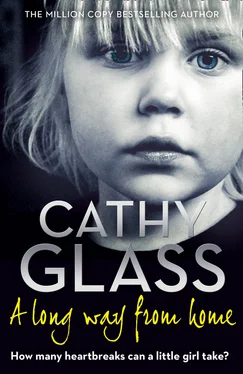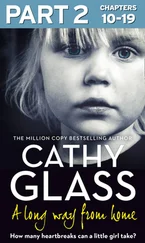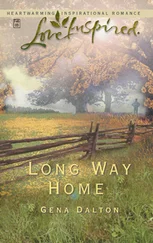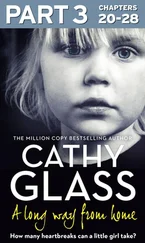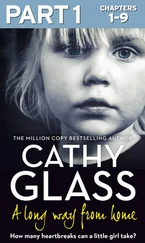‘Oh, you’d like to see what I have in here, would you?’ Elaine asked, pleased. ‘Of course. These are for you.’ She took out the doll and placed it in Anastasia’s lap. ‘Doll,’ Elaine said. ‘For Anastasia. Can you say doll? Doll.’ She knew that children learned language through imitation and repetition, but Anastasia was more interested in what else was in the carrier bag.
‘Crayons,’ Elaine said, handing her the packet of wax crayons. ‘And a colouring book.’ She set it on the floor and stuffed the empty carrier bag into her pocket. Although Anastasia was only two and a quarter, Elaine and Ian had friends with children of a similar age who managed to hold a crayon and make large swirls of different colours. But Anastasia had never seen a crayon close up before, let alone used one. She spent some moments examining the packet and then, selecting the red crayon, put it in her mouth.
‘No, love,’ Elaine said, stopping her. ‘It’s not to eat. It’s a crayon, we use it for colouring in. I’ll show you.’ She took another crayon from the packet and passed one to Ian, and together they began colouring in the first picture in the book, which was of a teddy bear wearing a spotted hat and scarf.
Anastasia watched intently for a while, then lost interest and, dropping the crayon, picked up the doll. ‘Doll,’ Elaine said. ‘You like the doll?’ Anastasia stared at them as though wondering who on earth these strangers were and why they were here.
‘It must be so difficult for her,’ Ian said. ‘I hope Dr Ciobanu has tried to explain to her what is happening.’
‘I would think he has,’ Elaine said, concentrating on Anastasia.
Suddenly Anastasia jumped up and, still holding the doll, ran to the window. Ian and Elaine followed her. The only redemptive feature of the room was a large window that looked out to the woods at the back of the orphanage. There were bars at the window and the glass was dirty, but it gave more natural light than the small grids in the nursery rooms and the view was encouraging. Anastasia reached one hand through the bars and banged on the glass with her little fist, then looked up at them imploringly. She didn’t need language to make herself understood.
‘We can’t go outside,’ Elaine said gently. ‘One day we will after we’ve been to court.’ Anastasia banged on the glass again and then held up the doll so she could have a glimpse of the outside. It was touching and upsetting. Anastasia hadn’t spent all her life in the orphanage as many of the other children had – some of it had been with her mother – so she knew a very different world lay out there. ‘Come on, let’s do some colouring,’ Elaine encouraged, but Anastasia remained glued to the window.
‘I don’t think she has been in this room before,’ Ian said. ‘She’s fascinated by the window.’
‘No,’ Elaine agreed. ‘I get the feeling she spends most of her time in that cot or helping in those so-called nurseries.’ Elaine’s eyes filled. Although they’d been aware of the conditions at these orphanages, it still hurt and angered them to see it for themselves.
‘But we mustn’t say anything,’ Ian reminded her. ‘They don’t like criticism.’ Which was one of the reasons change in social care had been slow.
Elaine bent down to Anastasia’s height. ‘We’ll take you out as soon as we can, love. We are going to visit lots and lots of places when we go home. Parks, the seaside, the zoo, activity centres and, when you are older, museums and castles. But for now we have to stay here. Let’s play with the doll.’ Elaine gently drew Anastasia from the window and to the beanbag, where she sat beside her.
It was a very basic, cheap-looking doll, but it was all the store had. Its dress was held on by Velcro and Elaine now showed Anastasia how to dress and undress the doll. Anastasia liked the tearing noise the Velcro made and spent some time sticking and unsticking it. Then she spotted Ian’s briefcase and made a grab for that.
‘Do you want to see inside?’ he asked, smiling. Anastasia tugged at the flap. ‘OK, I’ll show you, but you can’t have what’s in it. They are very important papers, about you.’
Ian unfastened the clip and allowed Anastasia to peer in, but he needn’t have worried about her wanting the papers and files – they were of no interest to a two-year-old, regardless of how important they might be. Anastasia was up again and at the window.
‘Come on and we’ll do some crayoning,’ Elaine said, going over. Anastasia tapped on the glass and looked at her imploringly again. ‘We can’t go out,’ Elaine said, shaking her head to signal no. ‘Let’s play with the doll again.’ But even as she said it, it was clear that all the child’s hopes lay in being allowed to go out. ‘What about these toys?’ Elaine said, going over to the broken toy cars and four plastic building pots that were already in the room. Anastasia glanced over to where Elaine pointed and then returned her attention to the window.
‘I don’t know what else to do,’ Elaine said to Ian. ‘We’ll have to buy some more interesting toys when we go shopping.’ Then she had a thought. Opening her handbag, she took out her mobile phone and went into the Photo Gallery. ‘Look, Anastasia, pictures!’
The child’s interest was piqued. She turned from the window to look, then allowed Elaine to lead her to the beanbag where she sat between them and they spent a pleasant ten minutes going through the photographs.
‘Well done,’ Ian said to Elaine. ‘When she’s finished with yours we can look at the photos on my phone.’
So the hour passed with photographs, some colouring, sticking and unsticking the Velcro on the doll’s dress, and visits to the window. While Ian and Elaine had thought an hour was a very short time to spend with their future daughter when it had first been mentioned, now it seemed appropriate. They were emotionally exhausted and had also used up their resources so that Anastasia had grown bored with what they had to offer. As well as gazing out of the window she kept looking towards the door, perhaps wondering when it would be opened. When the hour was up and they told her it was time for them to go and went to find someone to tell them they were leaving, she didn’t resist. Far from it. She seemed pleased to see the care worker again and ran to her side, but of course what is familiar feels safe to a young child. Elaine and Ian said goodbye to Anastasia, and the care worker issued an instruction to Anastasia. Without looking back, she ran off into one of the rooms and the care worker saw them out.
As they collapsed into the back of the cab the driver said, ‘First few visits always difficult. You and child strangers. It will get better. I bring a lot of couples here and they look like you to begin with – shell-shocked.’
Ian and Elaine laughed, relieved. ‘That’s the word – shell-shocked,’ Ian said. ‘You speak a lot of sense.’
‘You tell my wife that!’ the driver replied with a cheeky grin.
Chapter Five
Back in their hotel room, Ian and Elaine went over the time they’d spent with Anastasia, holding a post-mortem on the things they felt they’d got right and those they hadn’t.
‘It will get easier each time we see her,’ Ian said. It wasn’t just the driver who’d said this, but other families who’d adopted. They’d warned them not to expect too much during the first week of introductions and to just go with what the child felt comfortable with. This had also been covered during the three-day preparation course they’d had to attend in the UK as part of their adoption assessment.
Ian booked cabs for the following day, one for 9.30 a.m. to take them to the children’s store Dr Ciobanu had recommended in town, and the other to the orphanage for 2 p.m. Using public transport wasn’t an option, as buses were infrequent and unreliable. They were going to donate Lana’s belongings to the orphanage as Dr Ciobanu had suggested, so that night as Ian showered before bed Elaine sorted through their suitcases, carefully taking out what they’d packed for Lana that couldn’t be used for Anastasia: clothes, nappies, baby toys, packets of milk and food, dummy and so on. There was a lot; they’d brought extra in case they got delayed in the country, and had distributed it between both their cases. Now, as Elaine carefully put Lana’s belongings into carrier bags she kept finding herself overcome with emotion and had to stop to wipe away her tears. Although other children would benefit from their donation, these things had been bought specifically for Lana. Elaine remembered the joy she’d felt when choosing the little clothes and toys and carefully packing them in the cases. There were other first-year baby items at home and Elaine would sort out those when they returned.
Читать дальше
